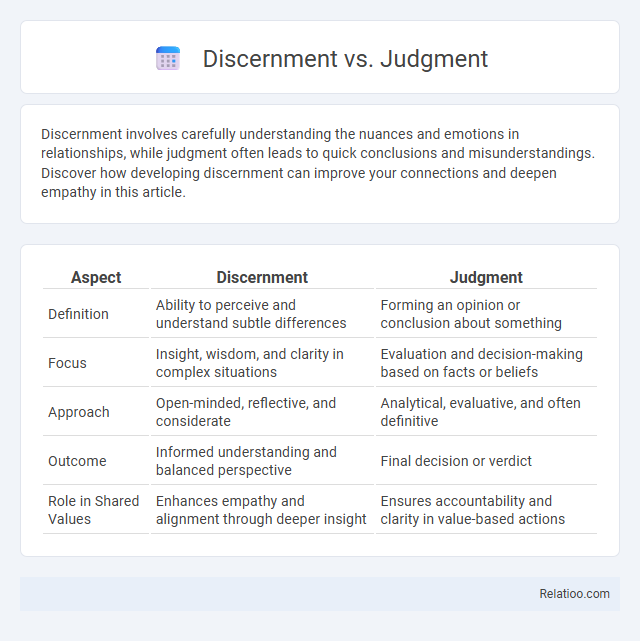Discernment involves carefully understanding the nuances and emotions in relationships, while judgment often leads to quick conclusions and misunderstandings. Discover how developing discernment can improve your connections and deepen empathy in this article.
Table of Comparison
| Aspect | Discernment | Judgment |
|---|---|---|
| Definition | Ability to perceive and understand subtle differences | Forming an opinion or conclusion about something |
| Focus | Insight, wisdom, and clarity in complex situations | Evaluation and decision-making based on facts or beliefs |
| Approach | Open-minded, reflective, and considerate | Analytical, evaluative, and often definitive |
| Outcome | Informed understanding and balanced perspective | Final decision or verdict |
| Role in Shared Values | Enhances empathy and alignment through deeper insight | Ensures accountability and clarity in value-based actions |
Understanding Discernment and Judgment
Discernment involves the ability to perceive subtle differences and understand deeper meanings, while judgment refers to evaluating information to form a conclusion or make a decision. Your ability to cultivate discernment enhances critical thinking by recognizing nuances and underlying truths beyond surface-level appearances. Developing both discernment and judgment sharpens decision-making skills, ensuring well-informed and balanced outcomes.
Key Differences Between Discernment and Judgment
Discernment involves the ability to perceive subtle differences and understand underlying meanings, enabling thoughtful decisions based on insight and intuition. Judgment, on the other hand, refers to forming an opinion or conclusion after evaluation, often involving criticism or approval based on evidence and reasoning. The key difference lies in discernment's emphasis on deep perception and wisdom, while judgment focuses more on decision-making and assessment outcomes.
The Role of Perception in Both Discernment and Judgment
Perception plays a crucial role in both discernment and judgment as it shapes how you interpret and evaluate information before making decisions. Discernment involves a deeper understanding and insight, relying on subtle cues and contextual awareness to differentiate between options, while judgment tends to be a conclusion or decision based on available evidence or perception. Refining your perception skills enhances discernment's subtlety and judgment's accuracy, leading to more informed and effective decision-making.
Emotional Impacts: Discernment vs. Judgment
Discernment involves clear, unbiased perception that fosters emotional balance by allowing individuals to understand situations without immediate emotional reaction. Judgment often triggers emotional responses such as defensiveness, guilt, or anxiety due to its evaluative and often critical nature. Employing discernment over judgment leads to healthier emotional regulation and more empathetic interactions in personal and professional settings.
Discernment: Cultivating Clarity and Wisdom
Discernment involves the ability to perceive and understand subtle differences, fostering clarity and wisdom in decision-making. It requires deep insight and reflective thinking to evaluate situations beyond surface appearances, enabling more thoughtful and effective choices. Unlike judgment, which often implies a conclusive decision, discernment emphasizes ongoing awareness and refined perception.
Judgment: Roots in Bias and Reactivity
Judgment often stems from unconscious biases and reactive thinking, leading to quick conclusions without comprehensive understanding. Unlike discernment, which involves careful analysis and thoughtful evaluation of facts, judgment can be clouded by emotional responses and preconceived notions. Developing discernment requires mindfulness and reflection to minimize bias and enhance clarity in decision-making.
Practical Applications in Everyday Life
Discernment enables you to recognize subtle differences and make insightful choices by analyzing context and intuition, whereas judgment often involves forming opinions or conclusions that can sometimes be biased or superficial. Practical applications of discernment include evaluating trustworthiness in relationships and making informed decisions without rushing to judgment. Developing discernment sharpens your ability to perceive underlying motives and long-term consequences, enhancing decision-making in both personal and professional life.
Common Misconceptions and Myths
Discernment often gets confused with judgment, though discernment implies insight and understanding beyond surface appearances, whereas judgment frequently involves forming opinions or conclusions, sometimes prematurely. A common misconception is that discernment requires critical evaluation alone, but it also entails sensitivity to context and nuance, distinguishing it from mere judgment. Myths surrounding discernment suggest it is an innate trait, but it is actually a skill developed through experience, reflection, and openness to multiple perspectives.
Benefits of Embracing Discernment Over Judgment
Embracing discernment over judgment enhances your ability to evaluate situations with clarity and empathy, fostering better decision-making and interpersonal relationships. Discernment allows you to recognize nuances and intentions behind actions, reducing misunderstandings and conflicts. By cultivating discernment, you develop a more balanced perspective that supports growth, compassion, and effective problem-solving.
Tips for Shifting From Judgment to Discernment
Shifting from judgment to discernment involves cultivating empathy and focusing on objective analysis rather than quick conclusions. You can enhance your discernment by practicing active listening, seeking diverse perspectives, and reflecting on your biases before forming opinions. Developing this skill improves decision-making by allowing you to evaluate situations more thoughtfully and with greater clarity.

Infographic: Discernment vs Judgment
 relatioo.com
relatioo.com